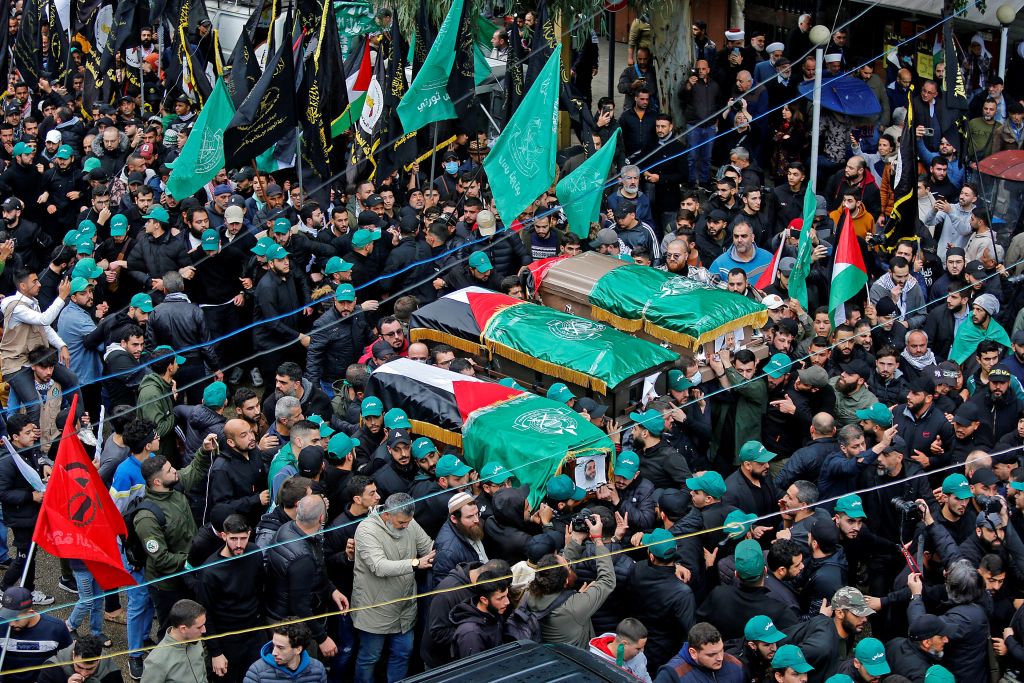When precision rockets killed Hamas deputy secretary-general Saleh al-Arouri and several other Hamas operatives in Beirut last week, Hamas lost one of its most important political leaders and operational commanders. Arouri played hands-on roles both as a key interlocutor with Hezbollah and Iran and as an operational commander overseeing Hamas terrorist plots in the West Bank. Indeed, it was Arouri who foreshadowed back in August—two months before the October 7 attack—that Hamas was planning to spark “an all-out war” with Israel. The Israeli campaign in Gaza has killed thousands of Hamas operatives and destroyed much of the group’s infrastructure, and Arouri’s death is a significant setback for Hamas.
In fact, it was Arouri himself who, many years ago, helped Hamas develop its playbook to help it recover from the death, arrest or deportation of key leaders. A close examination of this playbook reveals that the key to preventing Hamas from fully bouncing back from the loss of Arouri demands concerted action against Hamas support networks abroad.
Hamas experienced a series of setbacks in the years after its founding in December 1987. In 1989, Israeli authorities arrested at least 200 operatives tied to Hamas and Palestinian Islamic Jihad, including Hamas founder Sheikh Ahmed Yassin. Then, in December 1992, Israeli authorities rounded up some 415 Palestinian militants affiliated with both groups and deported them to a south Lebanon hilltop called Marj el-Zhour. Taken together, these actions gutted Hamas’ operational capabilities in the West Bank and Gaza, so the group looked to its supporters abroad for help.
The core of Hamas external support was then located in the United States. Hamas was a new, little-understood organization, and the FBI had not picked up on the group’s extensive fundraising activities in the country. Only later would the bureau learn that when Hamas first released its charter, one of its affiliated organizations—the Islamic Association for Palestine—published it in Chicago. The January 1993 arrest in Israel of American Muhammad Salah finally brought Hamas activity in the United States to the FBI’s attention. It also sparked a series of investigations across the country, including in Louisiana, Mississippi, New York, Ohio, Virginia, and Wisconsin.
Salah was arrested for providing funds to Hamas operatives in the West Bank specifically to “revitalize Hamas terrorist operations in the West Bank.” According to U.S. court documents, Salah and others sent hundreds of thousands of dollars from the U.S. to Hamas in the West Bank. In a 1992 meeting, a Hamas operative told Salah “that he had approximately 53 Hamas recruits who were prepared to carry out terrorist attacks, but that funding was needed to assist them.” Marzook and other Hamas operatives in the United States provided those funds, and over three months in 1992, Hamas claimed responsibility for eight different terror attacks.
One of the West Bank Hamas operatives who took receipt of these funds was none other than a young Saleh al-Arouri. Salah provided Arouri approximately $96,000 in August 1992, just a few months before Israeli authorities arrested the latter. By that time, however, Arouri had already provided Hamas operative Musa Dudin $45,000 “to be used for weapons to conduct attacks.” Dudin and other Hamas operatives used these weapons to carry out a long list of Hamas attacks. (Salah and others would be found liable for Hamas terror attacks in a landmark 2004 civil suit against Hamas supporters in the U.S.) That same year, the Department of Justice described Arouri as a “high-ranking Hamas leader” and named him as an unindicted co-conspirator in a 2004 indictment of three Hamas operatives.
Saleh al-Arouri was a founding member of Hamas’ Qassam Brigades, starting out as a college campus recruiter at Hebron University. Arrested in 1990, he was released after six months and quickly resumed his Hamas activities, now also sheltering wanted Hamas operatives and funneling funds to Hamas trigger-pullers. By the second time he was arrested, in 1992, the charges included serving in a “leadership role in Hamas.” In prison, Arouri was elected to the Hamas prison shura council, the leadership body for jailed Hamas operatives.
According to the U.S. government, since Arouri was released from an Israeli prison and deported in 2010, he funded and directed Hamas terrorist operations—including the 2014 kidnapping and murder of a teenage American and two other victims—from his various perches in Damascus, Doha, Istanbul, and Beirut.
Fast forward to 2023 when, in the wake of the October 7 Hamas massacre, U.S. authorities quickly ramped up investigations into Hamas activities in the United States. Focused on more pressing threats from the likes of the Islamic State and white supremacists, FBI investigations into Hamas activities had dropped in priority. But then Hamas killed at least 31 Americans on October 7 and took about a dozen more Americans hostage. The FBI launched “multiple investigations into individuals affiliated” with Hamas for fear that U.S.-based groups may have been raising funds or providing other material support to Hamas, a designated foreign terrorist organization. Other authorities opened investigations as well. The Virginia attorney general’s office opened an investigation into American Muslims for Palestine (AMP, also known as AJP Educational Foundation Inc.) for potential violations of Virginia’s charitable solicitation laws.
As Hamas seeks to recover from its battlefield defeat in Gaza and the loss of key leaders like Arouri, it will turn to its external supporters for help. Back in 1992, Hamas had just a few core supporters within the Palestinian diaspora. Today, it enjoys various degrees of support from Iran, Qatar, and Turkey, as well as diaspora donors around the world, including in the West. The Hamas playbook relies on such support in times of crisis, which is why it is so important for the international community to work collectively to disrupt Hamas’ external channels of support. To this end, the formation of the Counter Terrorist Financing Taskforce – Israel (CTFTI) in the wake of Hamas’ October 7 attacks is a step in the right direction. The task force is made up of financial intelligence units from countries such as France, Germany, the U.K., Australia and smaller European countries that seek to strengthen efforts to disrupt the flow of funds to Hamas and other terrorist groups.
And such information is already yielding dividends. Israeli authorities shared documents with their German counterparts, for example, exposing Qatari bank accounts opened under the names of Hamas operatives. Among the account-holders was Musa Dudin, Arouri’s partner-in-crime back in 1992. Another was Ahlam al-Tamimi, a convicted Hamas terrorist living openly in Jordan. Both played roles in attacks that killed Americans. It is unclear if the accounts remain active even after being publicly disclosed.
Hamas is under tremendous stress today. Disrupting Hamas’ playbook for recovering from such setbacks will come down in large part to preventing the group’s external support networks from being able to come to its rescue.
Read more of our coverage of the Israel-Hamas war.






Please note that we at The Dispatch hold ourselves, our work, and our commenters to a higher standard than other places on the internet. We welcome comments that foster genuine debate or discussion—including comments critical of us or our work—but responses that include ad hominem attacks on fellow Dispatch members or are intended to stoke fear and anger may be moderated.
With your membership, you only have the ability to comment on The Morning Dispatch articles. Consider upgrading to join the conversation everywhere.